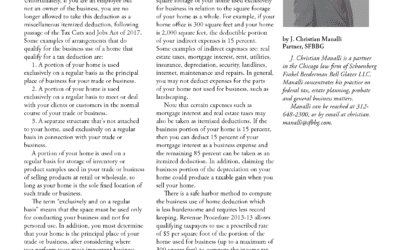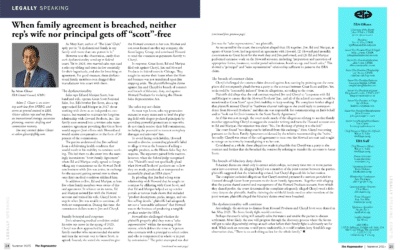On June 29, the Supreme Court clarified the circumstances under which requests for religious accommodations must be granted by employers who are subject to Title VII of the Civil Rights Act of 1964 (“Title VII”). Such employers must now grant requests for religious accommodations unless the accommodation would impose an “undue hardship” on the employer, meaning a burden that is both hard to bear and rises to an excessive or justifiable level in the overall context of the employer’s business.
Title VII makes it unlawful for a covered employer to discriminate against any individual with respect to compensation, terms, conditions, or privileges of employment because of his or her religion. “Religion” includes religious belief, as well as all aspect of religious observance and practice. Employees have made requests for workplace accommodations due to their beliefs since Title VII was enacted, and they are fairly commonplace today. Although beliefs and requests for accommodation vary greatly, some of the most common accommodation requests include flexible work schedules, dress code exceptions, time off for religious observances, prayer breaks, and modification of job tasks or assignments. More recently, many employers have fielded requests for exemptions from face mask and vaccination requirements.
The standard for such accommodations was clarified in 1972, when Congress amended Title VII to mandate that employers must “reasonably accommodate…an employee’s or prospective employee’s religious observance or practice” unless the employer is “unable” to do so “without undue hardship on the conduct of the employer’s business.” 42 U.S.C. 2000e(j). Although the statutory language seems clear that if an accommodation would cause an “undue hardship” it need not be granted, courts across the country have applied varying tests as to what constitutes an “undue hardship” on an employer’s business.
The divergent tests arose from the Supreme Court’s opinion in Trans World Airlines, Inc. v. Hardison, 432 U.S. 63 (1977), which references both “substantial additional costs” or “substantial expenses”, as well as “more than a de minimis cost.” Thus, some courts have interpreted “undue hardship” to mean that an employer is not required to grant a request for a religious accommodation if it can demonstrate “more than a de minimis cost” (i.e., more than trivial) in making the accommodation, while other courts have understood that the protection for religious practices is greater.
The June 29 decision in Groff v. DeJoy recognized that the statutory term “undue hardship” requires more than a de minimis burden, and took the opportunity to explain the difference and clarify the standard. The Court stated that the term “undue hardship” in Title VII “means what it says,” and explained that it means both “something hard to bear” and must rise “to an excessive or unjustifiable level.” The Court’s opinion makes clear that employers must grant requests from employees who seek an accommodation based on their religious beliefs unless the accommodation would create an “undue hardship” on the employer. The Court was also clear that the “burden” must be “substantial in the overall context of an employer’s business.”
When an employer receives a request for a religious accommodation, it must take into account all of the relevant factors, including the particular accommodations at issue and their practical impact in light of the nature, size, and operating cost of the employer. Though the Court acknowledged this is a fact-specific inquiry, it provided some guidance that employers can use in making the determination as to whether a request for a religious accommodation must be granted:
- An employer has met its burden if granting an accommodation would result in substantial increased costs in relation to the conduct of its particular business;
- Whether a hardship is substantial in the context of an employer’s business will be determined by a Court in a common sense manner;
- Bias or hostility towards a religious practice or accommodation is not a legal basis to deny an accommodation request; and
- In a situation where an employee requests a day off for observance, an employer must do more than conclude that forcing other employees to work overtime would constitute an undue hardship. The employer must also consider other options, such as voluntary shift swapping.
Considering the fact-intensive nature and the intricacies surrounding requests for religious accommodations in the workplace, it is advisable to seek guidance from experienced employment law counsel. We provide counsel and valuable guidance in understanding the legal landscape, evaluating reasonable accommodations, and assessing and mitigating potential risks or liabilities.
For any questions regarding these or other employment law matters, please contact Adam Maxwell via e-mail at [email protected] or by phone at (312) 648-2300.



